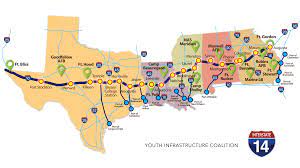
ATLANTA – Georgia motorists looking for a faster way to get across the state between Columbus and Augusta will have to wait a long time – if ever – for a solution.
A newly released study of options for moving freight through Georgia by the state Department of Transportation (DOT) has concluded that a plan to build the Peach State’s first interstate highway since the 1960s would not be a good return on investment.
Traffic projections show the proposed Interstate 14 likely would carry only an average of 3,000 trucks per day, well below the average daily flow of 11,000 to 18,000 trucks on Georgia’s existing interstates.
“I-14 demonstrated moderate benefits, including reduced congestion costs … and a decrease in vehicle hours of delay,” according to the report. “However, it is not projected to yield the same degree of positive impacts as other interstate highway projects such as I-75, I-20, I-95, and segments of I-16, especially considering the project’s initial cost estimate of more than $5 billion.”
Interstate 14 has its share of backers. The $1.2 trillion bipartisan infrastructure bill Congress passed in 2021 includes a provision designating the highway as a “high-priority corridor” that would run through five states from Texas through Georgia, connecting many of the Deep South’s military bases and ports.
On the state level, Georgia’s General Assembly passed a resolution back in 2019 supporting construction of the Georgia portion of I-14, picking up at the Alabama line at Columbus and extending to the South Carolina line in Augusta.
“It would be highly convenient for us in that part of the state,” said state Sen. Ed Harbison, D-Columbus, who sponsored the resolution. “When you come into Columbus from the west, you have to go almost to Atlanta to get to Augusta.”
But building interstate highways isn’t what it used to be. Funding for the original interstate construction program then-President Dwight Eisenhower launched during the 1950s ran out more than two decades ago, said Don Rodman, administrator of the Texas-based Gulf Coast Strategic Highway Coalition, which has worked for years to secure funding for the western portion of the I-14 corridor.
“These days, interstates cost about $30 million a mile,” Rodman said. “For I-14 in Texas, that’s about $30 billion. Nobody has that kind of money.”
Plagued by such high cost estimates, only about 25 miles of I-14 have been built in Texas. But even that’s more than has been constructed in any of the other four states along the route.
Rodman said he envisions I-14 as a multi-generational project.
“We’re probably talking about 100 projects along the I-14 route,” he said. “You build them incrementally. … The cheaper ones and the priority ones are the ones you build first.”
Harbison said he is concerned about the findings in the Georgia DOT study. He said the ability to connect military bases across the five states – from Fort Bliss in Texas to Fort Moore (formerly Fort Benning) near Columbus and Fort Eisenhower (formerly Fort Gordon) near Augusta would be particularly beneficial.
“I believe it has value … and will have a more positive impact than they’re projecting,” Harbison said.
The good news for Harbison and other I-14 backers is that the DOT isn’t giving up on the project completely.
“Because the I-14 project shows some benefit under the KPIs (Key Performance Indicators), a corridor study to further evaluate its feasibility would enable a more comprehensive understanding of the construction practicalities … as well as more specific project costs,” the report stated.
“I don’t understand why it would not be feasible,” Harbison said. “Given the benefit, I would encourage us to take another look at it.”